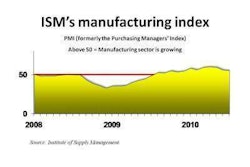The U.S. Department of Transportation’s Pipeline and Hazardous Materials Safety Administration on Tuesday, Feb. 1, announced another step in its efforts to improve the safe transport of hazardous materials by incorporating the provisions of six widely used cargo tank special permits into federal hazardous materials regulations. PHMSA says this new regulation will cut down on thousands of special permit applications per year.
“President Obama asked us to find ways to make our government better for the people of the United States,” says U.S. Transportation Secretary Ray LaHood. “Getting rid of this cumbersome process will maintain safety and save businesses and the government both time and money.”
PHMSA says the special permits all have long established safety records used to approve processes for hazmat transport not explicitly spelled out in PHMSA regulations. Over the years, the practices approved in these permits became commonplace and were proven safe, according to the agency.
“This rulemaking is another step in incorporating tested transportation technologies and operations from longstanding special permits into the regulations, promoting safety and streamlining our processes.” says Cynthia Quarterman, PHMSA administrator. “Streamlining the hazardous materials special permit and approvals process is a major priority for PHMSA.”
Last year, DOT released an action plan to improve PHMSA’s safety oversight, processes, procedures and policies for its hazardous materials special permits and approvals program. Six special permits will be incorporated into the hazardous materials regulations pertaining to the shipment of certain hazardous materials in cargo tanks:
• Two of the special permits cover hazardous materials mounted on farm trucks used exclusively for agricultural purposes – liquefied petroleum gas (LPG) and liquid soil pesticide (toxic substances);
• One special permit covers the transportation of hazardous materials used for striping roads;
• One special permit authorizes private motor carrier companies to transport propane tanks most commonly used for home heating and cooking; and
• Two special permits address nurse tanks: The first covers the transportation of nurse tanks securely mounted on field trucks, and the second authorizes the use of the nurse tanks carrying anhydrous ammonia under certain conditions when the tanks are missing or have illegible identification plates.









